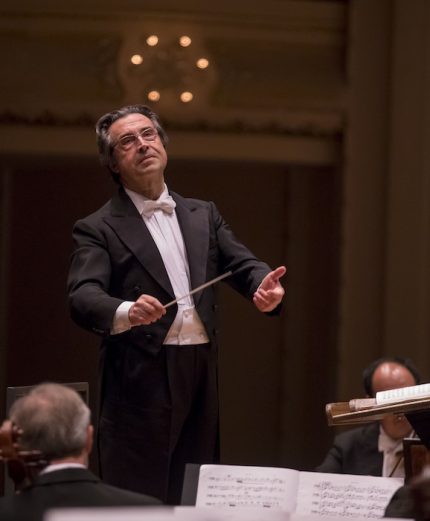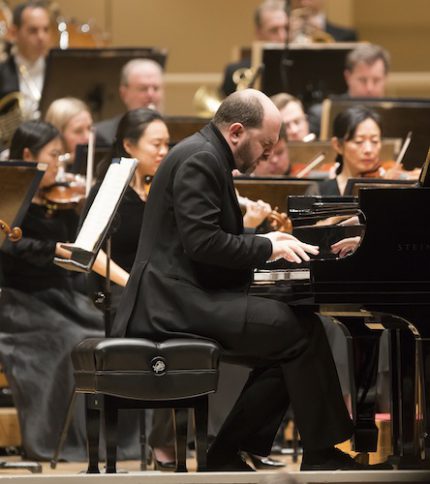Muti returns with Puccini rarity and delightful Strauss confection

Riccardo Muti was back on the podium at the Chicago Symphony Orchestra’s concert Thursday night–just his third week of concerts in Chicago this season and his final appearance of 2017.
And while the big Brahms concerto that closed the evening was clearly meant to be the program’s main attraction, it was the first half that provided the more consistent rewards.
A rare orchestral work by Giacomo Puccini led off the program. Written at age 23 while in his third year at the Milan Conservatory, the Preludio sinfonico may be a student work but the indelible, heart-easing melody is wholly characteristic of the soaring arias in the Puccini operas to come. Muti led an ardent reading, giving full brassy impact to the rolling climaxes, yet deftly tempering the richly upholstered lyricism to avoid crossing the line to schmaltz.
Muti–who led the orchestra in a community outreach concert at Lane Tech High School the previous evening–was clearly in a good mood Thursday. When a continuously ringing phone covered the hushed ending of the Puccini work, one braced for an explosion from the stage. Instead Muti smiled, joked with the front desk string players and, said to the audience, “Puccini was phoning.”
One associates performances by the CSO’s mercurial music director with fiery musical drama more than subtlety or wry humor. Yet the performance of Richard Strauss’s Suite from Der Bürger als Edelman showed Muti’s ability to bring out the musical charm with music in a lighter vein.
Written as incidental music for a performance of Moliere’s Le bourgeois gentilhomme that would be paired with Strauss’s opera Ariadne auf Naxos, the overlong and awkward Moliere part of the planned double bill was soon jettisoned. Various revisions of the Moliere project came to naught and Strauss eventually salvaged the score for the current suite.
Writing in the style of Lully and other Baroque and Classical composers–and occasional mining some of their music–Strauss retools his 17th and 18th century models with typical ingenuity wit and panache. The resulting confection for chamber orchestra may not be historically accurate—with small string ensemble, ample winds and brass and large percussion–but it’s fully Strauss.
Usually Der Bürger als Edelman’s neo-antique charms begins to pall long before the 36 minutes are up, but Thursday night’s performance was a pure delight from start to finish. Muti led the players in a vital reading that stylishly put across the surface Baroque and Classical idioms while consistently finding Strauss’s humor and subversive streak lurking beneath the surface Rococo-isms.
Highlights abounded: the string octet in the “Entrance of Cleonte” was rendered with the hushed intimacy of a Baroque Christmas concerto. In “The Fencing Master” the bravura roulades were sassily thrown off by trumpet, trombone and piano (the last played by the evening’s soloist Kirill Gerstein who doubled in an otherwise unobtrusive keyboard part). Stylish, personality-plus solos were heard in every section, especially concertmaster Robert Chen in “The Dance of the Tailors.” John Sharp’s cello solo provided a moment of rich, dark eloquence in “The Dinner’ amid the humor of the fast-flying culinary quotations.
Kirill Gerstein is among the finest keyboard artists of our day and with Muti and CSO as partners in Brahms’s Piano Concerto No. 1, one expected sparks to ignite in a work imbued with youthful fire and drama.
That didn’t happen. There were impressive elements to be sure—Gerstein’s technique was close to perfect in one of the most demanding concertos in the repertoire. In the Adagio, his hushed, inner playing conveyed the sense of a private, painful rumination.
Yet ultimately this was good rather than great Brahms—well played and performed but never quite jelling or exploring the depth of feeling in this vast canvas. In the outer movements Gerstein’s playing sounded underpowered in sonority and lacking the eruptive intensity the music demands. His straightforward playing of the first movement’s consolatory second theme had little expressive engagement and the finale was wanting in the edge of desperation that links it to the preceding movements.
As is not uncommon with Muti as accompanist, the soloist and orchestra too often seemed to be inhabiting parallel universes. For the 50-minute length of the concerto, Muti never turned to look at his soloist once.
The conductor–as he often does in Brahms–largely kept the deeper emotions and sadness of the music at arm’s length. There was a cool, streamlined quality to his orchestral accompaniment, which, while beautifully played, seemed more focused on highly polished details than exploring the expressive depths of this music or collaborating closely with his soloist.
Compared to the sonorous power and range of feeling in Nikolai Lugansky’s extraordinary performance of the same concerto last March with the St. Petersburg Philharmonic this was undeniably technocratic and dispassionate Brahms.
The program will be repeated 1:30 p.m. Friday and 8 p.m. Saturday. cso.org; 312-294-3000.
Posted in Performances






Posted Nov 21, 2017 at 2:57 pm by Mary Goetsch
I noticed something new on stage (besides using two different pianos in one concert)- what are the storage boxes located one each next to a double-bass player? They are about the size of a humidifier, and perhaps a needed function considering all the valuable wood on stage. But I saw one player place items on top and also opened box lifting up a divided flap in center.
Posted Nov 22, 2017 at 1:47 pm by Peter DG
We were at the Tuesday Nov. 21 performance. What fabulous performances. The Puccini and Strauss ware so much fun to hear. And the artistry in the concerto was just phenomenal. Beautifully played without being pretentious.
But the audience spoiled it all. A minute into the very soft second movement the coughing started and just became louder and louder to the point where you could not hear some of the notes, even form the first row of the balcony. People behave like they’re on an L platform or something. This is much worse at CSO than at the Lyric because when it’s quiet in orchestra hall it is truly dead quiet, as opposed to the opera house where the whoosh of the HVAC is so loud it will mask much of the audience noise (if not the prompter sometimes :-). Makes you think twice about re-subscribing.
Also Muti seemed a bit tired. Perhaps he too is fed up with Chicago’s inconsiderate audience. He was starting to come out the stage door for a second bow after the Strauss but the applause faded so he just turned around and walked out.
Posted Nov 29, 2017 at 12:34 pm by Mary G
Violist wrote me a Facebook Message to answer the question as to what are the small boxes in the double bass section. “They keep rosin, rags, and so forth in the storage boxes onstage.” I guess basses get these privileges on account of dealing with so much instrument.